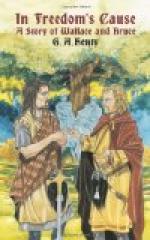After a time Sir Neil Campbell arrived with the vessels, and, accompanied by the Earl of Lennox, Bruce and his companions embarked at a point near Cardross. They sailed down the Clyde and round the south end of Arran, until, after many adventures and dangers, they reached the Castle of Dunaverty, on the south point of the Mull of Kintyre, belonging to Angus, chief of Islay. Here they waited for some time, but not feeling secure even in this secluded spot from the vengeance of their English and Scottish foes, they again set sail and landed at the Isle of Rathlin, almost midway between Ireland and Scotland. Hitherto Robert Bruce had received but little of that support which was so freely given to Wallace by the Scotch people at large; nor is this a matter for surprise. Baliol and Comyn had in turn betrayed the country to the English, and Bruce had hitherto been regarded as even more strongly devoted to the English cause than they had been. Thus the people viewed his attempt rather as an effort to win a throne for himself than as one to free Scotland from English domination. They had naturally no confidence in the nobles who had so often betrayed them, and Bruce especially had, three or four times already, after taking up arms, made his peace with England and fought against the Scots. Therefore, at first the people looked on at the conflict with comparative indifference. They were ready enough to strike for freedom, as they had proved when they had rallied round Wallace, but it was necessary before they did so that they should possess confidence in their leaders. Such confidence they had certainly no cause whatever to feel in Bruce. The time was yet to come when they should recognize in him a leader as bold, as persevering, and as determined as Wallace himself.
The people of Rathlin were rude and ignorant, but simple and hospitable. The island contained nothing to attract either adventurers or traders, and it was seldom, therefore, that ships touched there, consequently there was little fear that the news of the sojourn of the Scotch king and his companions would reach the mainland, and indeed the English remained in profound ignorance as to what had become of the fugitives, and deemed them to be still in hiding somewhere among the western hills.
Edward had in council issued a proclamation commanding “all the people of the country to pursue and search for all who had been in arms and had not surrendered, also all who had been guilty of other crimes, and to deliver them up dead or alive, and that whosoever were negligent in the discharge of his duty should forfeit their castles and be imprisoned.”




